2017 was a kind of Maria Turtschaninoff year for me. I read four of her novels plus the short story she wrote for the Aarhus 39 anthology, and I’ve got her other novels standing by to be read. Her writing is outstanding, and I’d been wanting to meet her, but it wasn’t possible until at the Edinburgh International Book Festival in August.
Maria was waiting for me just outside the authors’ yurt area, shortly after her event with Alwyn Hamilton, chaired by Daniel Hahn. I decided that it would probably be quieter ‘inside’ so we went back to find a free table near the yurt. The only background noise was from the buses round Charlotte Square.
I’d read on her blog that Maria’s mother died in the spring, and about how hard this hit her. It had been rather like reading my own thoughts – except twenty years later – and I wanted to talk to Maria about this. She was close to her single mother, and she expressed this so beautifully on the blog that it’d have been impossible not to be touched by what she said. I hoped it wasn’t proving too hard travelling and meeting people and talking. ‘This is going reasonably well, because it’s a bit of a distraction. But to be creative right now is impossible.’
Her mother seems to have been a strong and interesting woman, which leads me to guess that she’s very much behind Maria’s female characters. ‘Do you think that’s why you write so much about women, about girls?’
‘It’s possible. Absolutely. I have written about strong women, but I’m thinking I’ve never been surrounded by anything other than strong women.’ Maria laughs. ‘But it’s probably to do with other things as well. Maybe I write for the girl I was, who liked to read about girls who had adventures and did things, even if it didn’t matter so much if it was a boy or a girl as the main character [when I was a child].’
‘When I read Maresi I felt it was very anti men, but then I realised that it mightn’t necessarily have been; just that it’s for women and girls.’
‘Yes, that’s what’s so unusual. So many initially react, thinking it’s against men. It’s mostly about women, and the women are focusing on the men who hurt them. They don’t see the good men who exist. Although Maresi speaks very lovingly about her father.’
‘It was really interesting. And I was quite sure the book would go in a totally different direction, and that everything would go downhill. But instead they did what they needed to do, together, without saying bad things about each other or being mean. And that is so unusual.’
‘That, unfortunately, is true. We have seen more women in fantasy recently, but they are still very much alone. One lone, strong girl, surrounded by men. And she’s always an anomaly, the one girl. So for me it was important building a community, and my point is not to support the myth that girls can’t be friends. No one says that about males in books, apart from the lone traitor, the traitor with the knife. Other than that, they are friends, and no one says that’s abnormal,’ Maria laughs and sounds incredulous.
‘I thought it was so good the way the older ones teach the younger ones, letting them grow into their roles, supporting them and letting them do what they are good at.’
‘But they don’t always like each other. That’s what I think is important. You don’t actually have to best friends, but that doesn’t mean you are going to undermine each other, or hurt each other, just because you’re not of the same opinion.’
‘If we go on to Naondel, the first wife is surprisingly fair and open towards the women who come after…’
‘But she doesn’t like it. She does wrong towards them, to various degrees. In Maresi they are able to change their lives, they have power, they can choose freely, and then they don’t have to hurt each other. But if you are in a situation where there is no possibility of changing your life, without trampling someone else, to get higher, then you will. Because it’s the only way to go forward. As it was with Meriba.’
‘There was a lot of solidarity, considering that they ought not to get on, with such different backgrounds.’
‘That’s why I try to show how slowly this happens. It’s not immediate; they approach each other slowly. There’s a lot of time passing in that book.’
‘Will there be more books about them?’
‘There is at least a third one, which will follow Maresi.’
‘That’s what I believed Naondel was going to be.’
‘Yes, but these sisters were so terribly pushy,’ we laugh, ‘they had so much to say. I was going to write a completely different book, but then the sisters came and argued with me, and while I was writing about them, I realised I also wanted to write about what happens to Maresi.’
‘The island; it’s not in our world, so I can’t really ask where it is?’
‘No, you can’t, but if you compare with Arra and Anaché… So, Arra is set here,’ Maria waves her arms and laughs, ‘and Anaché up here in the north, northwest of… and Maresi is far south.’
‘So me trying to place them on Åland wasn’t such a good idea, then?’
Maria laughs heartily at this. ‘I’ve been trying to build a new continent, a new world. Naondel, that’s fairly far east.’
‘They’re definitely different countries and different continents then? I’ve just started reading Arra, which has a much more Finnish feel to it.’
‘Yes, it’s my second book, and I wanted to write something with a Nordic flavour, unlike all those Anglo-Saxon fantasy worlds you get. I wanted them to wear jumpers and not robes.’
‘It feels as if it could just be from a different period.’
‘My fantasy is quite subdued. Not a lot of sword-waving.’
‘No dragons.’
‘No, no magical animals in that way. It’s fairly realistic, but there is an element of fantasy which can’t be explained away as anything other than fantasy and magic.’
‘I am aware that there are differences between Sweden and Finland, so when I’m reading I don’t know if it’s actually something Finnish you are describing, the types of plants, etc…’
‘Well I think a lot of it is made up,’ Maria says with a slightly embarrassed laugh. ‘I like it slightly flowing, when you can’t be sure. There was an older woman, after Arra came out, who’d listened to the radio programme where I’d been talking about the book. She came up to me and said, “Maria, I’m amazed that you who are so much younger than I am, know so many more plants and animals than I do.”’ We both laugh. ‘So I said “that’s because I made them up, they aren’t real.” It’s the same with my translators. They frequently ask “is this a real bird, or did you make it up? Do I need to search for it, or can I make my own word?”’
‘Yes, if it’s made up it can be quite hard. And characters’ names. Do you feel you need to make up a name for every one of them?’
‘There is fantasy that mixes both, like Tolkien. I feel that you have to do one or the other, consistently. At least for me it doesn’t work if I don’t.’
‘Is it hard making up names?’
‘No, not at all. Sometimes it’s hard to find the right one. For instance, I had to search before finding Maresi’s name. I actually enjoy doing it, collecting and tasting odd words and names, maybe from other languages, turning them this way and that way, changing the order of the letters.’
‘I have just finished reading De ännu inte valda. In it you have given the two children ordinary names.’
‘Yes, because they live in our world. And their aunt is called Tove.’
‘I wondered if that had anything to do with Tove Jansson, considering that both write children’s books? I was pleased to hear Daniel Hahn describe your dress and its Moomin pattern, as I’d been afraid this could be the sort of situation when you mustn’t mention the Moomins…’ Maria laughs, ‘but everyone does.’
‘But it’s a thing, too. When I’m abroad I like to wear Moomin clothes, because it’s what people will remember, and I feel like I represent Finland.’
‘So you do like Moomin?’
‘I do.’
‘Because it can be rather a bore if people go on and on about the one thing they know.’
‘That’s good enough. Then they do know something about Finland. And then you can get them interested in other things to do with Finland.’
‘I’m surprised by how many books in Swedish are being published in Finland. And that it’s done with state support.’
‘Yes, you probably shouldn’t ask me about that, because I don’t know how it works.’
‘Not like that, but I do feel it’s positive that there are funds to support book publishing. Maybe there’s the same amount of support for books in Finnish?’
‘I assume so. I can’t say I’ve ever felt that there is an advantage to writing in Swedish in Finland. I write for young people, so the market isn’t big. Swedish speaking teens in Finland are few.’
‘I suppose the numbers keep going down. What about your family; what language do you speak?’
‘Swedish and English. My husband is American.’
‘Ah, hence your American accent.’
‘Yes. I had a lovely British accent once,’ she laughs, ‘but quite simply, he has ruined my pronunciation.’
‘Is your son bilingual, or trilingual?’
‘Trilingual, I’d say, with English and Swedish the strongest. But he does also speak Finnish.’
‘It wasn’t until a couple of hours ago that the penny dropped and I realised that your books get translated into Finnish… So it’s not automatic in any way, that if a book is published in Swedish, that it must be published in Finnish?’
‘No, nothing automatic about it. Many books don’t get translated into Finnish. For instance, De ännu inte valda has not been translated.’
‘It’s the kind of thing I’d just not considered. So it’s the same as if you get translated into any other language, Norwegian, say, or Russian.’
‘The funny thing is that we fall into a gap. Even if a book is translated into Finnish, the book will be considered to be foreign literature. It won’t be seen as Finnish. While in Sweden it will also be categorised as foreign literature.’
‘Mm, I’m beginning to grasp this now.’
‘There were many good reviews for the first books, as Swedish newspapers still offered a wide cultural coverage. But the books couldn’t be bought anywhere, as they had no Swedish publisher. So they sort of don’t exist. Now that Maresi and Naondel have a Swedish publisher, they can at least be bought in Swedish bookshops.’
‘Because I began by reading your books in translation, it’s only now that I’ve got to your books in Swedish, and I’m finding the language so lovely and old-fashioned. Would you say that’s the difference between Finnish Swedish and Swedish Swedish?’
‘Yes, partly. Because I write fantasy, I do it on purpose. I use language to paint the other world. Perhaps most in Arra where I really gave it all I had. Lots of archaic language to create the feeling of old style tales, while in Anaché I keep it a bit briefer, as the setting is more barren.’
‘I have been less keen on new Swedish YA due to the language having felt a bit lacking in some cases. And then when I read your books I realised that the language I had missed was there!’
Maria laughs, ‘that’s so nice to hear. Authors do try and write the way young people talk, but in fantasy I don’t need to refer to how people speak today. And as a matter of principle, I try not to write down, assuming this is going to be a word that’s too hard. My own vocabulary grew a lot by just reading books with really difficult words, and you don’t understand everything, but sooner or later you learn what they mean.’
‘Yes, don’t dumb down. I felt that in De ännu inte valda, that the children were quite young, but the language was still mature.’
‘Now that I’ve read it aloud to my son, I have realised that for this age group the book will probably often be read to children, and that the language isn’t necessarily the best to be read out loud. It’s been ten years, and I’ve learned since then. Maybe not simplify the vocabulary, but shorten the sentences and achieve a better rythm.’
‘I suppose you find your inspiration in Finland?’
‘I can be inspired by everything in the world,’ she replies, laughing. ‘Inspiration can turn up anywhere. I’ve visited Visby several times, to write, and Visby has an incredibly inspiring sense of living history. Anaché is set among nomads, so at that time I read a lot about nomads all over the world.’
‘Do you expect to continue with this world you have created?’
‘Oh yes, absolutely. Not exclusively. I’d consider writing other stuff as well, but as long as people are interested I am happy to carry on because there are so many possibilities. I can do almost anything I want. Create the countries I want, and the people I want, and I haven’t only moved around geographically, but also in time.’
‘When is Maresi set, timewise?’
‘Maresi is the newest of them all.’
‘So quite modern?’
‘Hmm, I don’t know about that. There could be something a bit later coming. I don’t know yet. Arra is the furthest away in time, although that and Naondel could be the same period. But I can’t quite remember,’ she laughs, ‘as I can’t recall my time scheme.’
I wave my copy of the Aarhus 39 anthology, ‘I really loved your story in this one.’
‘That’s so nice to hear!’
‘Please tell me it’s part of something longer that you are planning!’
‘No, we were given a theme. It was to be about a journey. We all wrote in different ways.’
‘I thought this one was fantastically good… but I want to read the novel now!’
Maria laughs happily, and I join in. ‘It was such fun to write. I haven’t written many short stories in my life, but it was great fun and it was very tight with the journey theme and the exact length it had to be.’
‘It’s marvellous when such a short story has so much content. I just can’t stop thinking about it.’
‘Oh how great! That makes me very happy. When I got the idea, I feasted on fantasy classics, on all the ways to reach the fantasy world in different books. They were my favourites when I was a child. The thought that there is another world, and if I just open the right door or have the right amulet or the right red shoes or something, then I can get there.’
‘I like the fact that the girl wasn’t trying to cheat her way back to where she’d been, but that they tried to assist her; not wanting to prevent or stop her.’
‘Yes, but I didn’t know that until I got to the end. “Aha, but this is interesting!” I even thought this could be fun to rewrite as a play. Then you could make it a bit longer, have more of what happens.’ Maria stops and says ‘it’s got really sunny.’
‘Yes, sorry. I hope you’re not frying?’
‘No, no.’
‘Come to Edinburgh for the sunshine!’
‘That was sort of unexpected.’ She laughs.
‘I’ve actually not had a single rainy day here this year. It’s only rained the other days.’ We talk about train travel during the festival. ‘It’s really hard work with all these people who hop on trains just because it’s August.’
Maria laughs, ‘people are hard work.’ She says she’s never had such good accommodation as she’s been given here in Edinburgh. ‘It’s in George Street, so I just cross the road and I’m here. It’s so new, and clean and sparkling.’
We talk about where you can sit to see authors, and generally look at people. She laughs and says she doesn’t really recognise authors. ‘I saw someone in the yurt, I think someone well known, but I don’t know who they are.’ I get my pile of books out, hoping to get them signed, ‘Do you have a pen?’
‘Yes, I have my signing pen. I bought a new one today, in Paperchase. It’s the best I’ve ever had. It’s perfect.’
I mention that I bought De ännu inte valda second hand, already inscribed by the original giver. ‘I thought it was so sweet, but I do wonder if little Inez didn’t like the book. It looks somewhat untouched…’
‘I’ll sign on another page. Do you want it to Ann, or..?’
I leave that decision to Maria, before we escape from our sunny corner by the authors’ yurt. It’s been good to talk after all my thoughts about her books. And Maria’s accent is so beautiful to listen to, and she doesn’t sound a bit like Little My. (You never know what to expect.) And a Moomin patterned dress always looks good in the Scottish sunshine.

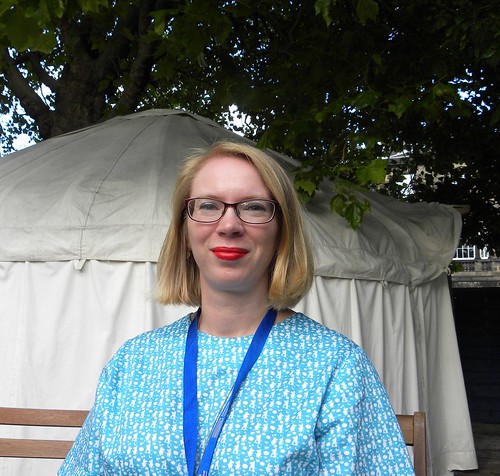
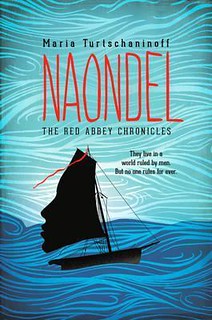
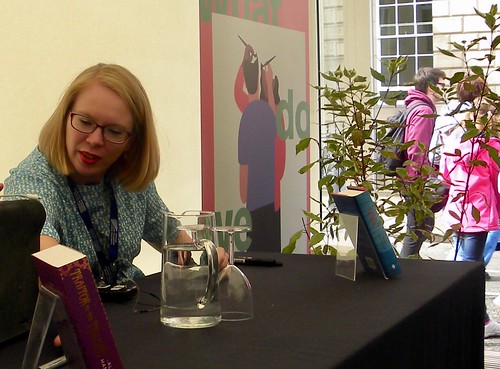
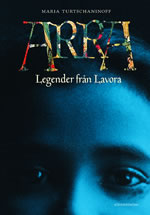
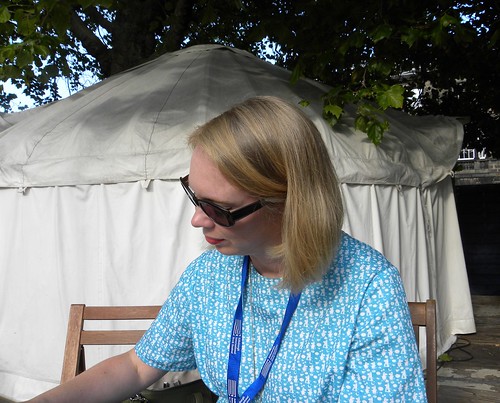
Pingback: #WorldKidLitWednesday: Maresi: Red Mantle |